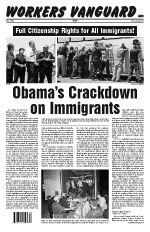
Geronimo ji Jaga (Pratt) 1947–2011 Geronimo ji Jaga, a former leader of the Black Panther Party (BPP) in Los Angeles, died at his home in Tanzania on June 3 at the age of 63. The cause of death is not known at this time. From 1970 to 1997, Geronimo was America’s foremost class-war prisoner, trapped in prison hell after being framed up by the LAPD and FBI for a murder they knew he did not commit. Eight of his 27 years in prison were spent in solitary confinement. Throughout his imprisonment, Geronimo remained unbroken and committed to the cause of freedom for the oppressed. Born Elmer Gerard Pratt, Geronimo grew up in KKK-infested southern Louisiana. He told WV: “The Klan killed a friend of mine. I think we were about nine or ten, swimming in the Atchafalaya River” (“Geronimo Pratt Speaks from San Quentin,” WV No. 382, 28 June 1985). His first jailing came at age 11 or 12, “for speaking to a white woman,” which “I didn’t even do because I grew up down there. I knew the rules.” With few job opportunities, at age 17 Geronimo joined the Army, serving two tours of duty in Vietnam, where he became a highly decorated paratrooper. After his first tour, Geronimo was sent to Detroit to help put down the 1967 ghetto rebellion. He recalled that his unit, 60-70 percent black, was supportive of the besieged ghetto, so “immediately they pulled us out of there.” He was then sent back to Vietnam. Like many veterans, Geronimo was radicalized by the Vietnam War. After returning to racist America, he sought in the Panthers the vehicle to place his military experience at the service of the black freedom struggle. Along with Robert F. Williams and the Deacons for Defense, the Panthers rejected the turn-the-other-cheek pacifism of Martin Luther King Jr. and advocated armed self-defense. Geronimo immediately became a prime target of the FBI’s Counter-Intelligence Program (COINTELPRO), in which 38 Panthers were killed and hundreds more imprisoned on trumped-up charges. One FBI memo spelled out, “Operation Number One is designed to challenge the legitimacy of the authority exercised by ELMER GERARD PRATT, BPP Deputy Minister of Defense.” On 8 December 1969, over 140 LAPD cops attacked the Panther headquarters where Geronimo lived. He survived the five-hour barrage but was later convicted on a minor weapons charge. Geronimo was subsequently charged with the 1968 murder of Caroline Olsen in Santa Monica. He was convicted in 1972 on the perjured testimony of Julius Butler, an informant for the LAPD, FBI and District Attorney’s office, and sentenced to life in prison. Geronimo was nowhere near the scene of the killing. As early as 1985, former FBI agent Wesley Swearingen revealed the existence of wiretaps showing that when Olsen was killed, Geronimo was 400 miles away in Oakland, attending a heavily surveilled and wiretapped BPP leadership meeting. But because of bloody factional division fueled by COINTELPRO, no Panther leader except for Kathleen Cleaver testified on his behalf. For refusing to confess guilt to a crime he did not commit, Geronimo was denied parole 16 times. To justify one such rejection, L.A. prosecutor Diane Vezzani declared that Geronimo was “still a revolutionary.” In the late 1980s, Geronimo played a pivotal role in enlisting the support of other former Panthers in the fight for freedom for death row political prisoner Mumia Abu-Jamal, which helped publicize Mumia’s case more broadly. In 1999, Geronimo endorsed the Partisan Defense Committee-initiated anti-KKK mobilization in New York City. In 2002, he endorsed an Oakland united-front protest against the USA Patriot Act and Maritime Security Act that was initiated by the PDC and Labor Black League for Social Defense. The Spartacist League and Partisan Defense Committee long fought for Geronimo’s freedom. Geronimo epitomized our characterization of the Black Panther Party as the best of a generation of black militants who sought a revolutionary road to black equality. But the Panthers’ black nationalist perspective and program doomed them to isolation in the ghetto, cut off from the only road out of the nightmare of racist American capitalism: integrated working-class struggle led to victory by a revolutionary vanguard party. Geronimo was able to find some years of contentment after settling in Tanzania. But we are bitter that over half his adult life was stolen from him, spent in prison under conditions that undoubtedly exacerbated his health problems and likely contributed to his untimely death. He will be missed!
|
|
||||||||||||||||||||||||||||||||||||||||||||||||
